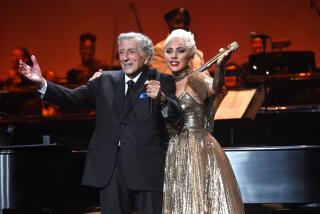The ‘Voice’ Still Lingers
- Share via
Coat slung over the shoulder, hat cocked over the face, Frank Sinatra makes his exit, almost a fable but just a man. His fights, his affairs, his songs all were sensational. He made some good movies, and created an image that a lot of young men, for better or worse, sought to capture in the 1950s and ‘60s. In more recent decades, Sinatra reinvented himself as the romantic late-night love-and-loss guy, cigarette in his lips, shot of bourbon in his hand.
The entertainer, who died Thursday night after months of failing health, was a complex character. One night he’d blister photographers at a nightclub, though it was where he went to be seen. A few weeks later he’d mail a note of thanks to a reporter who’d done a sweet story about a kid in trouble. Sinatra came from trouble himself, a boisterous life in Hoboken, N.J. He never shook the tough guy role, nor ever really tried.
But that’s not what his many decades of fans will remember. They’ll hear “the voice,” which became a nickname, a smooth, pure baritone bridging the verses. He sang with the best bands of the era--Harry James, Tommy Dorsey--hot songs, swing songs, love songs. And he was a lover, four wives along the way.
When Sinatra sang “The Lady Is a Tramp,” and that lyric about “the rest of the brawds,” he delivered the classic Noo Joisey intonation in a way disrespectful yet perfect to the image, the saloon and cafe scene in which the singer mingled after dark. He knew a few mobsters in his day, and he also hobnobbed with Kennedys.
From the time we first saw him thrilling bobby-soxers at the Paramount in New York in the early 1940s, through the smash Capitol albums of the ‘50s and ‘60s and later on his own Reprise label, he never short-changed us, despite those blessedly few TV specials of a frail Sinatra no longer able to hold the note.
He waltzed with lyrics, he waltzed with us when we were blue. Now the wee small hours will never be the same.
More to Read
The biggest entertainment stories
Get our big stories about Hollywood, film, television, music, arts, culture and more right in your inbox as soon as they publish.
You may occasionally receive promotional content from the Los Angeles Times.








